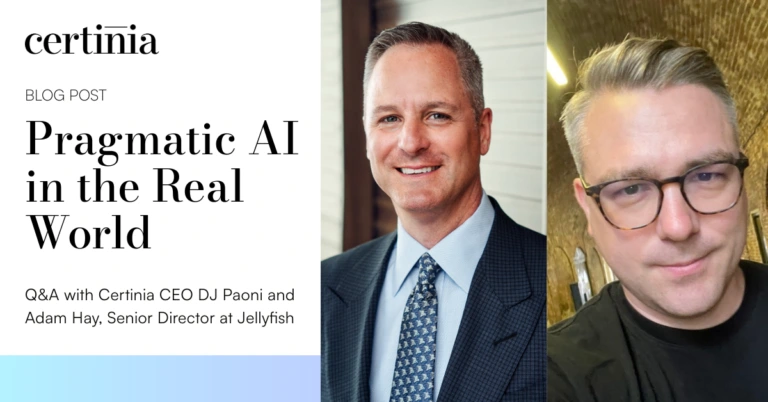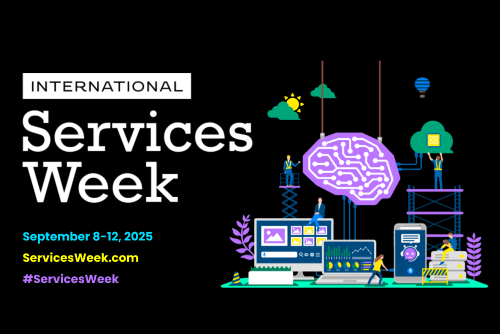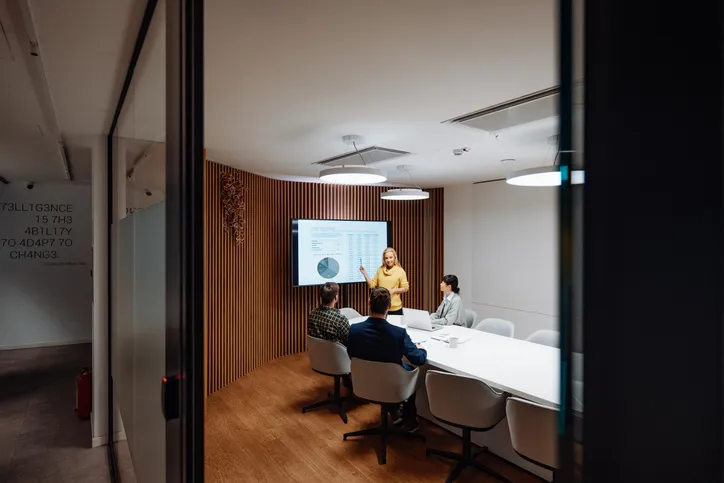Pragmatic AI in the real world: Q&A with early adopter Jellyfish
- June 18
- 7 Minute Read

Here’s a paradox: according to the Global Service Dynamics 2024 report, PSOs reported that they expect AI to increase their efficiency (81%), improve service quality (69%), and increase their profitability (66%).
And yet… 54% reported that adapting to AI will still be one of their biggest external challenges over the coming year.
Despite the massive upside AI presents, PSO leaders report that adapting to AI will be a more difficult challenge than outranking competition and the tight market for skilled labour.
That’s why it was such a pleasure getting to hear from Adam Hay, Senior Director at Jellyfish, who recently joined our CEO DJ Paoni for a brief chat about their experience as an early adopter of Certinia AI. ((Check below for their full conversation!))
One of the core tenets of Certinia AI is pragmatism. AI that is pragmatic is designed to be actionable, closed loop, and deployable:
- Actionable: It transforms complex models into practical tools that users can apply directly to enhance decision-making.
- Closed Loop: Integrates data, insights, and actions into a self-improving cycle, enhancing its efficiency using platforms like Salesforce.
- Deployable: Seamlessly embedded within existing workflows, providing real-time suggestions and improvements without needing separate tools.
This approach not only makes AI practical and user-friendly but also ensures it delivers tangible business value.
In their conversation, Adam Hay shares why Jellyfish is so eagerly embracing AI, their initial use cases, and some challenges that still stand in the way of broader adoption.
Without further ado, here’s their conversation!
DJ Paoni: Adam, thanks for joining us today! Can you start by giving everyone a quick overview of Jellyfish and your focus areas?
Adam Hay: Thanks for having me! Jellyfish is a global digital marketing organisation spread across 22 countries. We provide our clients with a “platform to perform” so they can get the best reach and the performance out of their marketing. We’ve recently been acquired by the Brandtech Group, which comprises 13 different businesses with the sole aim to create the number one generative AI marketing organisation. My role here at Jellyfish is the Product Owner and Senior Operations Director within the EMEA region. Among other things, I’m responsible for making sure that Certinia’s products are meeting the needs of our business. We’ve been PS Cloud users for the past four years, and recently started implementing Services CPQ. We have an incredible partnership with Certinia; you really do stick by us, are patient with us, and invest the time and attention to make sure that we’re successful.
DJ Paoni: We love to hear that! So, Jellyfish uses Certinia AI capabilities. What drove you to be one of our early adopters?
Adam Hay: I think a lot of it is influenced by our integration into the Brandtech Group and our positioning in the marketplace. It’s provided us with new opportunities and drive to enhance our operational efficiencies, both in the front office and the back office. By being an early adopter of Certinia AI, we want to get a head start streamlining these operations, reducing effort and enabling quicker, more informed decisions regarding business expansions, resource allocation, and margin improvements. Essentially, being an early adopter of AI aligns with our broader goals to optimise business operations and decision-making processes.
DJ Paoni: Can you talk about some of the AI projects you’re currently working on with Certinia?
Adam Hay: We’re excited to be part of Certinia’s early adopter program. Right now we’re focusing on understanding AI models to leverage our data effectively. It’s been a learning curve because it relies on a lot of the data being clean and accurate. At the moment, we’re working on predicting margin as well as project scheduling risk. How can we get ahead of the curve or understand the impact our resources are having on our projects? It’s like looking around corners and seeing what’s ahead before it happens. So far we’ve had really good feedback, and we’re getting really close to putting it into production.
DJ Paoni: You mentioned clean data as a big hurdle. What have been some other big hurdles in the way of adopting AI?
Adam Hay: Besides the challenge of maintaining clean and accurate data, the emotional and educational aspects of AI adoption are significant. Not everyone in the business understands how it works, so there is certainly a journey ahead for both users and leaders. It’s easy to fall into the trap of simply following trends and doing what everyone else is doing, but that approach isn’t always effective. Instead, we’re focused on investing in progress — learning, educating ourselves, and applying that knowledge in practical ways.
Right now we’re doing a lot for our clients using Generative AI, creating impressive results. There’s concern among employees about AI potentially taking their roles. It can put you in a scary place to think, “Well, is AI going to replace me?” But it simply isn’t the case. We see AI as an opportunity to realise the potential of our staff, particularly those responsible for delivering Business Intelligence (BI), allowing them to focus on the outcomes that insight provides. It’s not a major hurdle, but it’s a part of our journey where we are working to build confidence and grow.
DJ Paoni: I love the idea of freeing up employees to focus on more strategic work and outcomes, rather than the more routine tasks that AI can assist with. So, we’ve been partners for a long time. How can partners like Certinia really engage with organizations like yours on the AI journey? And what do you think are the key components to ensure, or better ensure, success from that perspective?
Adam Hay: I think Certinia always does a great job of listening to the business first before introducing any tools or technology. It’s about understanding the business needs to ensure the solutions provided truly add value. Certinia engages by learning and listening to organisations, remaining patient while keeping a high level of engagement. They involve companies in early adopter programs and show real-life examples of successful use cases, which is much more effective than theoretical discussions. At Jellyfish, we’re privileged because of the group we belong to, but we haven’t been implementing these practices enough within our organisation. Having Certinia by our side to drive the possibilities and demonstrate what’s achievable has been instrumental in influencing decisions and changing the minds of our leadership and users.
DJ Paoni: I appreciate what you said about Certinia listening. It’s a critical aspect of our approach when working with customers—we need to listen and take both positive and negative feedback to pivot quickly. So, as a final question, what excites you most about the near-term and long-term potential of AI within Jellyfish?
Adam Hay: I think in the short term, it’s about getting everyone educated. I’m excited for our team to feel that they’ve acquired the skills to realise their potential and start coming to us with ideas, like, ‘What if we did this?’ or ‘What if we did that?’ These might be areas we haven’t focused on before but can really leverage. In the long term, it’s about using pragmatic AI, or any form of AI, to help us make speedy decisions. We operate in a very fast-paced industry, and if we’re not scoping our work effectively and learning from that process, we risk losing business. It’s about being the first to get there and doing it the right way. That’s what I’m looking forward to—being able to quickly turn things around and improve our revenues.
DJ Paoni: Adam, we deeply value our partnership with Jellyfish and really appreciate your participation today. Thanks for taking us through your AI journey!
Adam Hay: Thanks for having me!
Recent Articles
Maximize your Salesforce investment with Certinia






